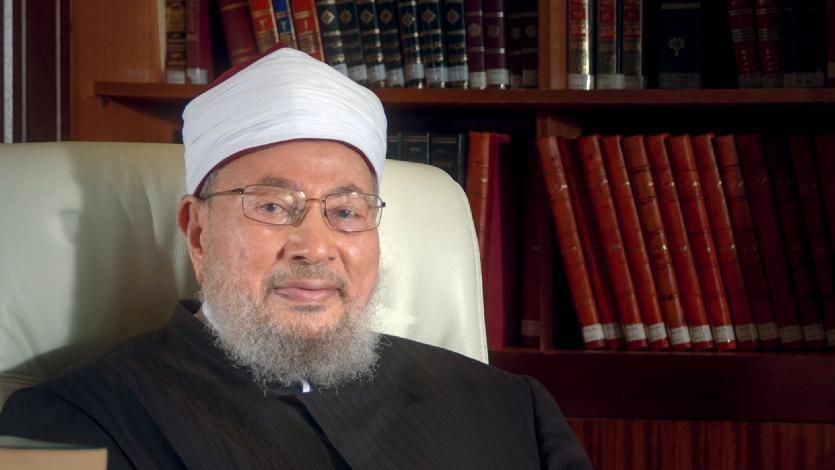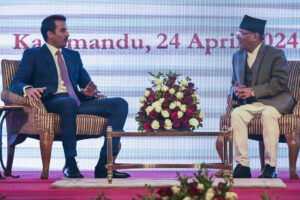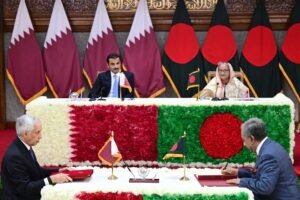
The scholar was the main religious reference for Egypt’s outlawed Muslim Brotherhood.
Prominent Muslim scholar Sheikh Yusuf Al-Qaradawi has died at the age of 96.
The scholar had been battling deteriorating health since contracting COVID-19 last year, with the International Union of Muslim Scholars [IUMS] taking to Twitter in 2021 to ask for increased prayers for the Muslim figure.
Al-Qaradawi established the IUMS in 2004, in which it serves as one of the most prominent religious authorities in the Muslim world.
Early life
Born in 1926 in Egypt’s Nile Delta, where he spent his early childhood, Al-Qaradawi fully memorised the Holy Quran before reaching the age of 10 and began giving sermons at age 16.
He then joined the Al-Azhar institute for primary and secondary education, where he was ranked the second-top student in high school and entirety of Egypt.
Al-Qaradawi joined the Faculty of Fundamentals of Religion at Al-Azhar University, where he pursued his graduate studies from 1952-1953, later graduating as the valedictorian and received a teaching license.
In 1960, he obtained a preliminary higher education equivalent to a masters in the Division of Qur’an and Sunnah Sciences from the College of Fundamentals of Religion [Usul Al Deen].
He worked in Egypt as a supervisor to the Institute of Imams at the Ministry of Endowments and supervisor of publications at the General Administration of Islamic Culture in Al-Azhar Al-Sharif.
Al-Qaradawi was also part of the technical office of the Department of Advocacy and Guidance before moving to Qatar to become the dean of its secondary religious institute in 1961, where he was also granted Qatari citizenship.
Political life
The Muslim scholar was known for his affiliation with the Muslim Brotherhood as one of its main theological and religious thinkers, noting his influence by Hasan Al-Banna, the founder of the group.
His membership with the Muslim Brotherhood led to his arrest several times during his lifetime, since 1949 when he was a high school student, as former Egyptian leaders launched security campaigns against the movement perceiving them to be a thread.
After Gamal Abdel Nasser’s coup d’etat in 1952, the leader’s desire to assume full power in Egypt led him to crackdown on institutions that were not considered “Nasserite”, which included the Muslim Brotherhood.
This triggered more arrests of members of the movement including Al-Qaradawi, leading the scholar to go into exile to Qatar, 1961.
Al Qaradawi returned to Egypt during the revolution in 2011, after Hosni Mubarak was toppled, where he gave his first Khutba [sermon] in Tahrir Square to millions of demonstrators and worshippers.
The scholar was also known to be a vocal opponent of President Abdelfattah El-Sisi and was sentenced to life in prison in absentia following the country’s 2013 military coup which sought to overthrow Egypt’s first democratically elected president, Mohamed Morsi.
Egypt also issued a warrant for Qaradawi’s arrest through Interpol on charges of incitement to commit murder, which were later disregarded.
In 2017, the Sisi regime unlawfully detained his daughter, Ola Al-Qaradawi, and her husband, Hosam Khalaf, for their relations to the Muslim scholar based on no charges.
She was later released in 2019 and rearrested after a prosecutor charged her for supporting a terrorist group “using her relationships in prison,” despite spending the two years in solitary confinement.
Achievements
In 1973 Al-Qaradawi established the Department of Islamic Studies in the Colleges of Education for both males and females at Qatar University, where he also established the College of Sharia and Islamic studies in 1977. He remained the dean of the faculties until the end of the academic year 1989-1990.
Qatar also sent the Muslim scholar to Algeria in 1990-1991 to chair the scientific councils of its university and higher Islamic institutes, before returning to his work at Qatar University as the Director of the Centre for Sunnah and Biography Research.
Al-Qaradawi gained more prominence as a key Muslim figure in 1996, through Al-Jazeera’s Islamic talk show “Sharia and Life” where he was a a regular guest speaker.
The Muslim scholar gave Islamic fatwas [jurisprudence and laws] on the show, which were seen as a reliable reference to the religion.
The sheikh also wrote more than 120 books on Sharia, most importantly “Al Halal Wal Haram” [The Halal and Haram] which was perceived as a modern day handbook on Islamic jurisprudence.
Al-Qaradawi received the Islamic Development Bank Prize in Islamic Economics; the King Faisal International Prize; the Sultan Hassanal Bolkiah Prize (Sultan of Brunei) in Islamic jurisprudence for the year 1997; the Sultan Al Owais Prize for Cultural and Scientific Achievement for the year 1999; the Dubai Prize for the Holy Qur’an as the Islamic Figure of the Year; and the State Appreciation Award for Islamic Studies from Qatar for the year 2008.
He was also known for advocating for women’s rights by calling for banning female genital mutilation and honour killings, denouncing religious extremism and was part of a delegation to Afghanistan to convince the Taliban not to destroy Buddhist statues at Bamyan.
In a controversial fatwa, he stated that Palestinian suicide attacks in Israel are an act of self-defence, which resulted in the US and the UK banning him from entry to their borders.
With his rich academic life, his support for the Egyptian revolution, publications and fatwas, Al-Qaradawi helped shape the Islamic understanding of the Islamic faith, leaving behind a significant legacy for many Muslims across the globe.







